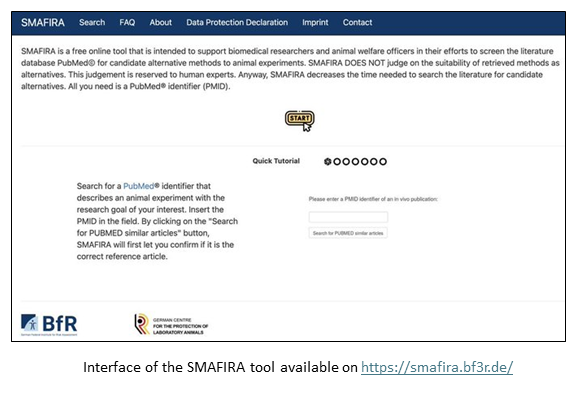SMAFIRA: A tool for searching alternative methods in the Pubmed database
Challenges in finding information on alternative methods
The rapid development pace and continuous use of alternative methods can make it challenging for several stakeholders to access information on these methods. In addition, searching the scientific literature is both labor-intensive and time-consuming. This issue affects not only scientists preparing animal experimentation applications, who need to justify why their research cannot be conducted using non-animal methods, but also authorities and members of ethical committees seeking relevant information.There is thus a clear need for developing tools that can facilitate the search for information on alternative methods.
Introducing SMAFIRA
SMAFIRA is an innovative search engine created to find alternative methods to animal testing in the published scientific literature. The tool supports biomedical researchers and other stakeholders in screening the PubMed database to find alternative methods to animal experiments in a fast manner. SMAFIRA has been developed by the German Center for the Protection of Laboratory Animals (Bf3R) at the Federal Institute for Risk Assessment.
Types of alternative methods searchable via SMAFIRA
SMAFIRA allows users to search for a variety of alternative methods, including:
- In vivo: living vertebrates (including cephalopodes);
- Tissue/biopsy: isolated vertebrate organs and tissues;
- Primary cell: freshly isolated vertebrate primary or stem cells;
- Immortal cell: established vertebrate cancer or immortal cell lines;
- Invertebrate: invertebrates or invertebrate material (excluding cephalopods);
- Human: human/patients and or any kind of human material (including organs/tissues, primary cells and immortal cells);
- Virtual model: computer simulations;
- Others: any other kind of experiments.
How to use SMAFIRA
To use SMAFIRA, start with a PubMed identifier (PMID) for a publication that describes an animal experiment relevant to your research interest. Enter this PMID into the online tool, which will then generate a list of studies in the same field that use alternative methods. The results can be filtered by the type of alternative method, such as in vitro methods or computational models, making it easier to find suitable alternatives.The results can be filtered by type of alternative methods (e.g. in vitro methods, computational models, etc).
Sources:


